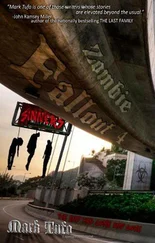She picks up the phone. She just wants to let him know that last night she went a little crazy — who knows why. But with the light of day, her senses have returned, and she doesn’t need him to take her to the hospital after all.
“What are you talking about?” he says. “I was just about to leave to pick you up.”
“No,” she says. “That’s not necessary.”
“Lynn,” he says, “I’m picking you up.”
“Martin, I’m already at work. I’m a block away from the hospital. I don’t need to be picked up.”
“Lynn, why are you doing this?”
She promises to call when she’s out of surgery. He protests again, but she insists. She hangs up and staggers over to the white leather sofa. It’s cluttered with free samples of former client products — cans of motor oil, boxes of lightbulbs — and accordion file folders full of documents. Moving all this to the floor she lies down and, just before falling asleep, resolves that when she wakes up, the first thing she will do tomorrow — today — is clean this shameful office, and make a new start of things.
ON NOT GETTING IT — BENNY SPOTS CARL — HOSING THE ALLEYWAY — MARCIA’S HAIRCUT — AN INADVERTENT OFFENSE — THE NEW BUSINESS — A REQUEST FOR GENEVIEVE — THE CAFETERIA — GOING UNDER — THE DIFFERENCE BETWEEN JOE AND THE REST OF US — “THESE PEOPLE” — AN ELITIST — THE WATER TOWER — WHY IT WASN’T CYNICISM — THE GARDEN HOSES — JOE MAKES A DECISION
IN THE MORNING WE CAME in and hung our spring coats on the back of the door and sat down at our desks and sifted through last night’s e-mail for something good. We sipped our first cups of coffee and cleared our voice mails and checked our bookmarked websites. It might have been a day like any other, and we should have been grateful, ecstatic even, to find no declaration of bankruptcy waiting for us in our in-boxes and no officewide memo announcing eviction from the building. We had every reason to believe that payroll management still acknowledged our existence, that Aetna had been paid and remained committed to our well-being, and that no one had been granted a seizure order to repossess our chairs.
Why, then, did discomfort pervade the hallways and offices? What made this morning different from others like it?
The unfinished pro bono ads that had eluded us the day before. We had been asked — was it possible? — to create an ad that made breast cancer patients laugh, a strange and vexing assignment. What was the point of it? No matter. Our job wasn’t to ask what the point was. If that had been our job, nothing articulated to prospective clients in our capabilities brochure and on our website would have escaped our rolled eyes. The point of another billboard outside O’Hare? Another mass mailer on your kitchen table? Good luck mustering an argument for more of that glut. If we had to call into question the point, we’d have fallen into an existential crisis that would have quickly led us to question the entire American enterprise. We had to keep telling ourselves to forget about the point and keep our noses down and focus on the fractured and isolated task at hand. What was funny about breast cancer?
We didn’t have an answer, and it was making us nervous. Jim Jackers, fearing the blank page and searching for direction among the hoi polloi, was not the only one who suffered anxiety about turning in crap work. One crap ad could make the difference between the person they kept on and the one they let go. No one could say that was the criterion, but no one could say it wasn’t.
But it wasn’t just our jobs at stake, was it? When we had trouble nailing an ad, our reputations were on the line. A good deal of our self-esteem was predicated on the belief that we were good marketers, that we understood what made the world tick — that in fact, we told the world how to tick. We got it, we got it better than others, we got it so well we could teach it to them. Using a wide variety of media, we could demonstrate for our fellow Americans their anxieties, desires, insufficiencies, and frustrations — and how to assuage them all. We informed you in six seconds that you needed something you didn’t know you lacked. We made you want anything that anyone willing to pay us wanted you to want. We were hired guns of the human soul. We pulled the strings on the people across the land and by god they got to their feet and they danced for us.
What, then, were we to make of an empty sketch pad or blank computer screen? How could we understand our failure as anything but an indictment of us as benighted, disconnected frauds? We were unhip, off-brand. We had no real clue how to tap basic human desire. We lacked a fundamental understanding of how to motivate the low sleepwalking hordes. We couldn’t even play upon that simple instrument, embedded within the country’s collective primal cortex, that generates fear — a crude and single-note song. Our souls were as screwy and in need of guidance as all the rest. What were we but sheep like them? We were them. We were all we — whereas for so long we had believed ourselves to be just a little bit above the others. One unfinished ad could throw us into these paroxysms of self-doubt and intimations of averageness, and for these reasons — not the promise of gossip or the need for caffeine — we found ourselves driven out of our individual offices that morning and into the company of others.
“I could not believe it,” said Benny Shassburger, leaving his office just as we had settled in. This was an old trick of Benny’s — to abandon us at the moment we needed him most, so that we knew never to take him for granted. He stopped briefly in the doorway and turned back. “Hold on a sec while I fill up my coffee and I’ll tell you the whole story.”
We talked among ourselves until he returned. “Okay,” he said, coming into the room with a full mug and a trailing odor of stale coffee grounds. He sat down and the delicately webbed seat sank for him a little more than it did for the rest of us. He squared himself to his desk and said, “So who did I see this morning parked right outside the building but — what?” He stopped midsentence. He had something — “Where?” It was on his other cheek — we hoped to god he’d find it fast. He wiped his whiskerless face and looked down. “Doughnut glaze,” he said.
There were doughnuts? Benny’s story would have to wait for those of us wanting doughnuts. Those of us who’d already eaten, or who were watching their weight, or Amber Ludwig, who had just split open a brown banana and was already halfway through it, filling Benny’s office with its singular ripe musk — we sat tight.
Benny proceeded to tell us that he’d seen Carl Garbedian parked in the drop-off zone just outside the building, Marilynn in the driver’s seat beside him. Was it possible? Our understanding was that Carl and Marilynn were separated. “Of course they’re separated,” he said impatiently. “But if you’ll just let me tell you my story. .”
CARL SAT IN THE PASSENGER SEAT of the car looking out upon the day. There was his building, up ahead, with the beggar he knew so well sitting cross-legged near the revolving doors, tired this hour of the morning, it seemed, as he hardly had the energy to shake his Dunkin Donuts cup at all those entering. As Carl glanced around, he recognized people from the office converging upon the building, but nobody he cared to talk to.
Directly to his right, something curious was going on. Two men in tan uniforms were hosing down the alleyway — a small dead-end loading dock between our building and the one next to it. Carl watched them at their work. White water shot from their hoses. They moved the spray around the asphalt. The pressure looked mighty, for the men gripped their slender black guns, the kind seen at a manual car wash, with both hands. They lifted the guns up and sprayed the Dumpster and the brick walls as well. They spot cleaned, they moved refuse around with the stream. For all intents and purposes, they were cleaning an alleyway. An alleyway! Cleaning it! Carl was mesmerized. It was the sort of thing, six months ago, that would have sent him right over the edge, seeing these men, these first-generation Americans without much choice in the matter, spend their morning in the dark recess of a loading dock power-spraying the asphalt and the Dumpster — good god, was work so meaningless? Was life so meaningless? It reminded him of when an ad got watered down by a client, and watered down, until everything interesting about the ad disappeared. Carl still had to write the copy for it. The art director still had to put the drop shadow where the drop shadow belonged and the logo in its proper place. That was the process known as polishing the turd. Those two poor saps hosing down the alleyway were just doing the same thing. All over America, in fact, people were up and out of their beds today in a continuing effort to polish turds. Sure, for the sake of survival, but more immediately, for the sake of some sadistic manager or shit-brained client whose small imagination and numbingly dumb ideas were bleaching the world of all relevancy and hope. And meanwhile, that mad-bearded fellow there with his crossed legs could hardly lift his grease-caked hands to make it a little easier for someone to flip him a quarter.
Читать дальше












